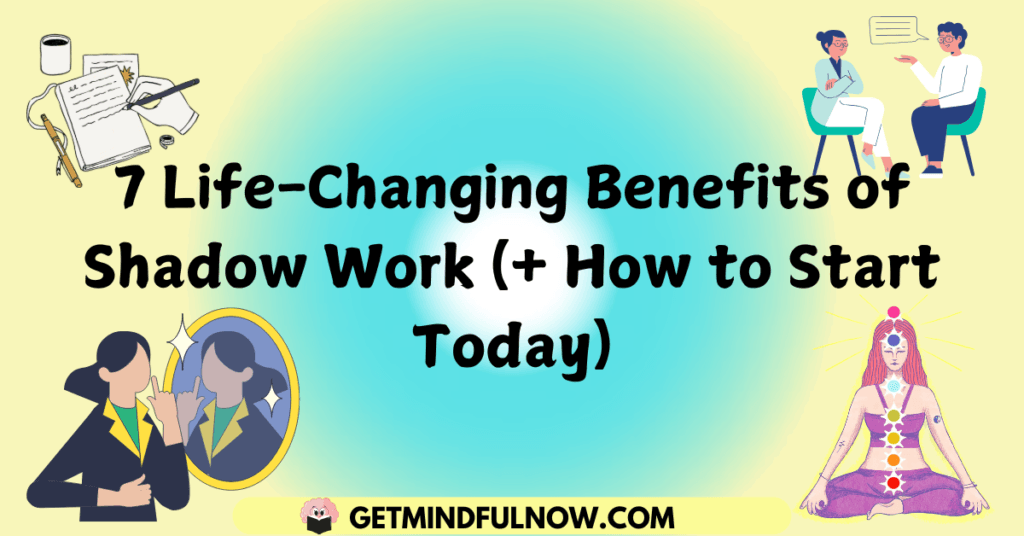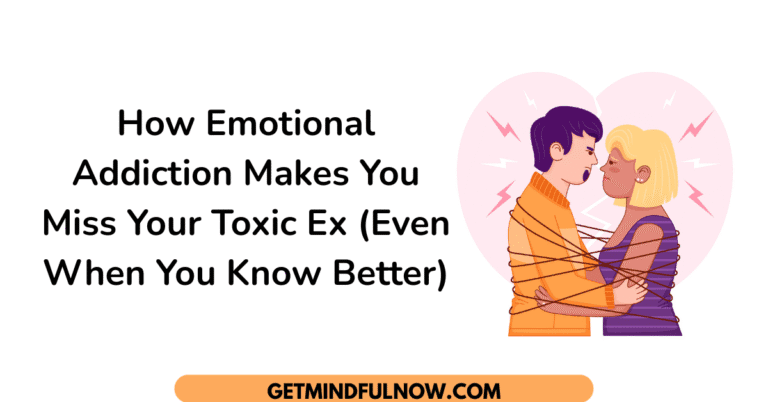Let’s get honest, not just with each other, but with ourselves.
You’re not weak. You’re not naive. You’re not under some mystical spell. You’re in a biochemical loop. And unless someone teaches you what’s actually happening in your body, you’ll keep calling it love when it’s really withdrawal.
That feeling of wanting them even when they made you feel worthless? That wasn’t love, it was your nervous system begging for the emotional fix it got used to.
The rush when they text you back. The ache when they disappear. The constant scanning of your phone. That’s not a soulmate. That’s a nervous system hijack.
And once you see the truth, once you realize your body is literally wired to repeat what’s familiar, not what’s healthy, you’ll stop asking what’s wrong with you.
Because nothing’s wrong with you.
You were just never taught how emotional addiction works.
It’s not love. It’s a drug. And your nervous system is craving its next hit.
So, Why Do You Keep Going Back?
You break up. You cry. You block them. You tell yourself, “I’m done.” Then three weeks later, you’re texting them, stalking their Instagram, wondering if maybe they’ve changed.
Spoiler: they haven’t.
But your body? It’s working overtime to convince you otherwise.
The truth is, you’re not just emotionally attached-you’re biochemically addicted.
That’s not poetic. That’s neuroscience.
When Your Body Gets Addicted to the Pain You’re Trying to Escape
A book I read some good years ago breaks it down with unsettling clarity: every time you feel a strong emotion, your brain releases chemical signals that your body memorizes. These emotional signals, especially those tied to fear, rejection, or craving, become like drugs your cells start relying on.
It’s called emotional addiction.
this is what happens:
- You feel an emotion (like abandonment).
- Your brain releases neuropeptides that match that emotional state.
- These peptides travel throughout your body, binding to receptors on your cells.
- The more often this happens, the more your cells develop specific receptors for those peptides.
Your cells, quite literally, become biochemically dependent on that emotional state. So when you try to stop feeling that way, like when you leave a toxic ex, your body protests. It craves the familiar signal. And it will trick your brain into creating scenarios to relive it again.
You’re not addicted to a person. You’re addicted to the emotional experience they represented. The pain becomes your “normal.”
That’s why even thinking about cutting them off causes a real, physical reaction.
You’re Not Craving the Person-You’re Craving the Hit
Let me be blunt: you’re not texting your ex at 2 a.m. because they’re your twin flame. You’re texting them because your body’s chemical baseline is screaming for familiarity.
- The longing? That’s dopamine.
- The anxiety when they don’t respond? That’s cortisol.
- The relief when they finally do? That’s your fix.
And every cycle, ignore, engage, fight, repeat, is strengthening those neural pathways.
The emotional high-and-crash of the relationship created a full-blown emotional addiction. And your body isn’t trying to heal. It’s trying to relapse.
That’s why thinking your way out of it doesn’t work. Your prefrontal cortex might say, “I deserve better,” but your limbic brain (emotional memory) is like, “Maybe just one more conversation…”
“But I Just Love Them So Much” — No, You Don’t
You love the feeling they gave you when they were good. You love the fantasy of who they could be. You love the version of yourself that felt wanted.
But deep down, you know this:
- You didn’t feel safe.
- You were constantly overthinking.
- You felt high when they gave you crumbs, and empty when they disappeared.
Love isn’t supposed to feel like withdrawal.
That wasn’t a connection.
It was a trauma bond, built on a cocktail of chemicals your body kept memorizing.
And every time you go back, you’re feeding the addiction-reinstalling the exact version of yourself you’re trying to outgrow.
Real-Life Example: The One You Couldn’t Quit
Let me tell you about someone I knew (fine, it was me).
There was a guy who made me feel like the center of the universe one day, and a ghost the next when the long-term commitment comes to table. I’d write angry letters I’d never send, delete his number… and then end up answering his call like nothing happened.
The moment I saw his name on the screen, my heart rate spiked, my stomach dropped, and all logic left the building.
Why? Because my body was trained to respond to his emotional pattern. I had rehearsed that loop so many times it became automatic.
I wasn’t in love. I was in chemical submission.
Why This Is So Hard to Quit
Quitting isn’t just emotional, it’s biological. the science explains: your cells don’t just receive emotion; they demand it.
Every time you break up and try to change, when you create distance, go no contact, or decide to finally move on, you disturb the chemical homeostasis your body has grown dependent on. And your cells panic.
Because those emotional chemicals (like stress, longing, rejection, guilt) are not just habits, they’re biochemical addictions. Your body interprets the lack of those familiar chemicals as a crisis, just like a drug withdrawal.
So what does it do? It sends signals, actual messages through the peripheral nervous system, that travel up your spinal cord and into the brain. These messages scream: “Get me the chemicals. Recreate the environment. Do what it takes.”
This is your body launching a full biological campaign to get you back into the emotional loop. Your prefrontal cortex may know better, but your cells are running old programming, and they’re loud.
That’s why your brain suddenly starts romanticizing them. That’s why your heart races when you hear their name. That’s why silence feels unbearable.
Your body is not sabotaging you maliciously, it’s trying to restore its known chemical state.
Until you interrupt the cycle at the nervous system level, your biology will fight your healing like it’s a threat to survival.
This is why staying gone feels impossible. Not because you’re broken, but because your cells have a past to protect.
So What’s the Way Out?
This isn’t a mindset issue. It’s a reconditioning issue.
The way out isn’t just about deleting contacts or repeating affirmations. It’s about interrupting the biochemical signals your body is addicted to, and teaching it to crave something new.
This is what that requires:
- Conscious rehearsal: Visualize and emotionally experience your future self responding with calm and strength, not craving and collapse.
- Daily stillness work: Meditation isn’t optional. You have to shift your brainwaves into alpha and theta to access the subconscious and rewire it.
- Somatic release: Move the energy. Shake. Cry. Walk. Let your body physically let go of stored reactions.
- Emotional substitution: Practice feeling peace, gratitude, relief, until those states become as chemically familiar as chaos once was.
- Inner identity building: Anchor into a version of you that doesn’t chase pain for meaning. The more often you feel safe inside yourself, the less you’ll search for external chaos.
This isn’t spiritual fluff. This is neurological reprogramming.
And once your body no longer relies on the chemical hits your ex used to deliver?
That’s when you’ll finally feel free-not just in thought, but in biology.

A 5-Step Meditation-Based Guide to Break the Loop (Fully)
This isn’t a morning routine. This is chemical rehab for your nervous system.
1. Start in Stillness (Before You Check Your Phone)
Your brain is most programmable in the alpha/theta state. Sit upright. Breathe. Drop below the noise. You want to access the subconscious.
2. Call Up the Emotional Loop (Don’t Avoid It)
Feel what happens in your body when you miss them. Name it. Don’t dramatize, observe. Tight chest? Spinning thoughts? That’s withdrawal.
3. Visualize a New Pattern
Picture yourself responding differently to the same old trigger. No texting back. No justifying. Just calm. Picture that version of you living from peace, not panic.
4. Feel the Emotion of Freedom
Here’s the key: don’t just visualize, emote. Feel what it would be like to not crave them. To feel full. To feel steady. Let your nervous system memorize that.
5. Close With a Command to Your Body
End your meditation by saying: “This is who I am now. My body follows me, not the past.”
Repeat this daily. You’re not just calming your mind. You’re retraining every cell to stop chasing your ex and start recognizing peace.
Journal Prompt: What Am I Really Craving When I Miss Them?
Be honest. Are you craving:
- Being chosen?
- Feeling worthy?
- Escaping loneliness?
- Getting that familiar rush?
Write the truth. No fluff. Then ask: How can I create that feeling without going backwards?
Final Word: You’re Not Weak. You’re Addicted. And You Can Heal That.
You’re not broken for missing someone who made you suffer.
You’re not dumb for going back when you swore you wouldn’t.
You’re chemically wired to seek what’s familiar. But here’s the power:
Once you understand it’s addiction-not love-you can finally start doing the work that sets you free.
This isn’t about blocking them. It’s about uninstalling the emotional coding they activated in you.
You can rewire that, become someone who doesn’t get high on breadcrumbs and you can choose peace, and not feel bored by it.
Subscribe & Follow
If this hit home and you want more raw, neuroscience-backed blogs like this, delivered in plain language and no-BS emotion, subscribe to my newsletter and follow me on Threads.
Because healing doesn’t mean being softer. It means being smarter than your chemistry.








